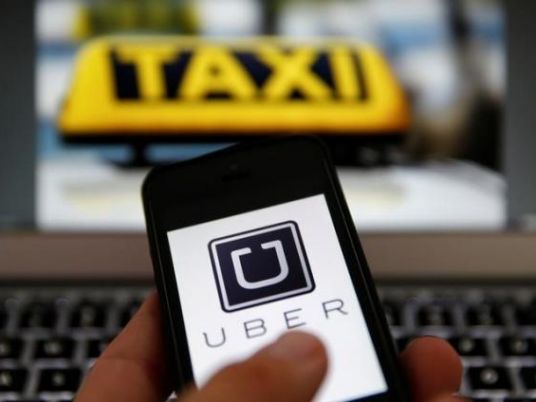
As the popularity of private taxi companies including Uber and Careem rises, white-taxi drivers have launched numerous campaigns to regain the trust of passengers. Amid fears of losing income and profits being channeled out of the Egyptian economy, drivers feel these private companies are pulling the rug from under their feet. On the flipside, some ministers believe the public are voting with their feet — looking to private companies for safe, reliable services that white-taxis often fail to provide.
Turning over a new page
"We have kicked off these campaigns as a response to harsh criticism in the media, who are giving the impression that all of us are corrupt. I admit you do see violations and improper practice from many taxi drivers. In this campaign we are attempting to educate such drivers to build civilized relationships with clients," Hamada Abdel Latief (40), white-taxi driver and member of the unofficial Association for White-Taxi Drivers told Egypt independent.
One of these campaigns is called "Take a ride, start afresh", aiming to improve the image of taxi drivers by promising passengers better service and a guarantee against bad practices like sexual harassment, smoking and meter fraud. Another campaign encourages drivers to put a sticker on their taxis that says, "A new beginning, kindly step onboard" as a sign that the driver is respectable.
White-taxi driver Hany Shaker argues that the culprits of the crisis are an impolite, unprofessional few. It is their bad practices, he says, which have forced disillusioned customers to flock to private companies like Uber and Careem. "I speak on behalf of 70,000 taxi drivers who are the breadwinners for their families — we will not give up," he stated.
In a message to drivers Shaker said, "We can still bring this under control — the rug hasn't yet been pulled from under our feet. Uber and Careems' employees are not better than us. So please," he urged white-taxi drivers, "improve your treatment of customers, give some thought to your taxi maintenance and hygiene, dress presentably and don't refuse to pick up customers." Shaker also insisted that drivers use their meters on every journey without intentionally breaking or rigging them, and be cheerful to clients.
Victims of a failed project
According to Shaker, the "real" problem began when the government launched its white taxi project in 2007 as an alternative to traditional black taxis, in an attempt to improve drivers' circumstances. The project was handed to corrupt businessmen and finance ministers who, Shaker claims, manufactured taxis that were off-specifications, overpriced and had low-quality spare parts, therefore exacerbating the problem.
"The government denied responsibly, and the drivers became victims. The burden on taxi drivers, squeezed by expensive monthly tariffs and taxes, began to affect their treatment of passengers. This is what has prompted people to switch to private taxi applications: it was revenge for the bad white taxi services" Shaker said.
Echoing Shaker, Hamada Abdel Latief told Egypt Independent that taxi drivers have suffered from government negligence, adding that despite the rising prices of spare parts and fuel, drivers have not raised their tariffs more that 15 piasters.
White taxi drivers have organized several protests over the "unfair" competetion with Uber and Careem. At a recent protest in the neighborhood of Mohandiseen, Cairo, white-taxi drivers blocked the flow of traffic with their vehicles, prompting security personnel to fire tear gas to disperse the protest. In 2014, taxi drivers demonstrated against the government in an effort to raise tariffs after a noticable increase in fuel prices.
Damaging the economy
Both Shaker and Abdel Latif predicted that the use of taxi applications will harm the Egyptian economy, as the proceeds will be directed to foreign companies instead of being fed into the Egyptian system.
"The money I currently earn goes to supermarkets, butchers and greengrocers, meaning it will circulate within the Egyptian market, but when passengers pay their bills through Visa to Uber or Careem, the money is being channelled to foreign economies instead," Abdel Latif maintained.
Reaching a compromise
The Cabinet decided last week to form a ministerial committee to discuss the legal sitiuation of Uber and Careem. The committee will be headed by the Minister of Justice and attended by ministers of transportation, finance, social solidarity, investment, local development and a representative of the Ministry of Interior. They will draw up suggestions of how to tackle the problem ready to be presented at the next Cabinet meeting.
Prime Minister spokesperson Hesham al-Qawish said that it is important to keep the new private taxi companies as they offer unique services which the Egyptian market desperately needs. In a telephone interview with privately-owned channel CBC, Qawish said that the prime minister is making decisions that will allow Uber and Careem to be licensed, putting an end to white-taxi drivers' complaints over their unlicensed rivals.
In another development, last Thursday the Ministry of Social Solidarity hosted an official meeting with representatives of Uber, Careem and the unofficial Association for White-Taxi Drivers to reach a compromise. The government has not unveiled the outcomes of the meeting, and Uber PR manager Mariam Toulon told Egypt independent that "The meeting was confidential'.
"We are engaging a number of stakeholders on how we can work together to achieve the type of regulations that will bring technology into the transport space, and we have an ongoing, open dialogue with the cross-ministerial committee. Uber has a long-term commitment to creating tens of thousands of jobs and entrepreneurship opportunities and recently announced a US$250 million investment in the region, a large portion of it going towards expansion in Egypt," said Uber in a press statment for Egypt Independent.
The statement also pointed out that since launching in Cairo, Uber has created work opportunities for over 2,000 drivers a month. More than 40 percent of the drivers had been unemployed prior to joining Uber.


